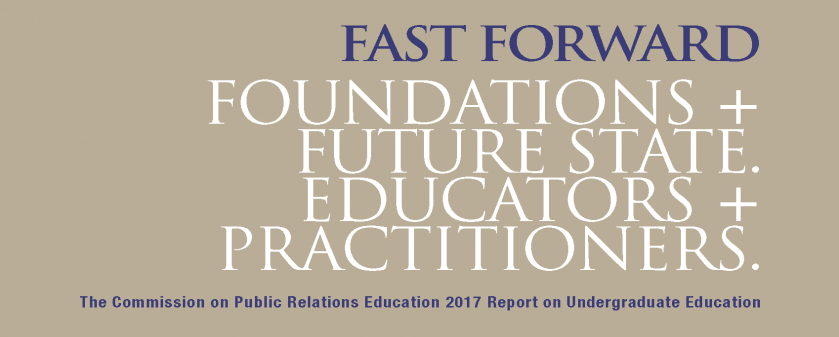This post appears courtesy of the Commission on PR Education.
Download Report (PDF): Fast Forward: Foundations and Future State, Educators and Practitioners

After three years of research in the U.S. and abroad, the Commission on PR Education released a major report of findings and recommendations with clear, consistent and compelling direction for PR students, those who teach them and those who hire them.
The report’s title, “Fast Forward: Foundations and Future State, Educators and Practitioners,” reflects the research-based recommendations from 60 Commission members who conducted research, formulated observations and developed more than 80 recommendations to enhance public relations education.
Eight Key Takeaways:
- Speed is essential: There is universal agreement among practitioners and educators that the ability for educational efforts to move, be nimble and adaptive, is critical. PR education mirrors the industry, which is in a time of incredibly intense change.
- Writing must be strong for all platforms: Writing is the core competency that practitioners and educators agree must be improved.
- Ethics is critical: Ethics, always the critical tenet of our profession, is now more than ever a commitment that begins in the classroom. A required ethics course was also added to the existing five CPRE-recommended required courses (principles, research, writing, internships, and campaigns).
- Diversity is crucial: As a profession that helps organizations relate to their worlds, diversity must begin on campus and in the classroom. Not just as a business strategy, but because it is the right thing to do.
- Core qualifications Identified: Identified core qualifications include a liberal arts education, and knowledge and skills learned from courses that cover topics including strategic communications, measurement and evaluation, social media, publicity/media relations, and content creation.
- Practitioners and educators remain committed to the foundations of PR: This includes research, theory, and required paid internships for real-time learning. There is also agreement that a global perspective must be acquired by undergraduates, and that outside-the-classroom experience in campus activities, student-run media and public relations agencies and The Public Relations Student Society of America (PRSSA) also develop needed knowledge and skills.
- Change is everywhere: New technology is being used and taught in the classroom, online programs must produce the same level of learning as in the classroom, and an evolving faculty model is emerging, with Ph.D. educators, professors of practice and adjunct faculty who all need to be prepared to teach effectively, and to have some level of professional experience.
- Ongoing dialogue and partnership among practitioners and educators: This ongoing dialogue will allow industry needs to be translated into curricula and experiential learning, and educators can receive the support necessary for their work and for their students’ development. Educators and practitioners, industry and the academy must work together.
The 2017 CPRE Report will be used by university PR departments and programs to develop curricular and out-of-classroom experiential learning for thousands of undergraduates studying public relations at more than 1,200 universities.
About the CPRE
The CPRE is the authoritative voice on PR education. Since its founding in 1973 by the Public Relations Division of the Association for Education in Journalism and joined by co-sponsor the Public Relations Society of America, the Commission has provided recommendations on public relations education for universities and professional associations across the globe. These recommendations have been adopted and adapted to positively impact undergraduate and graduate public relations education.



